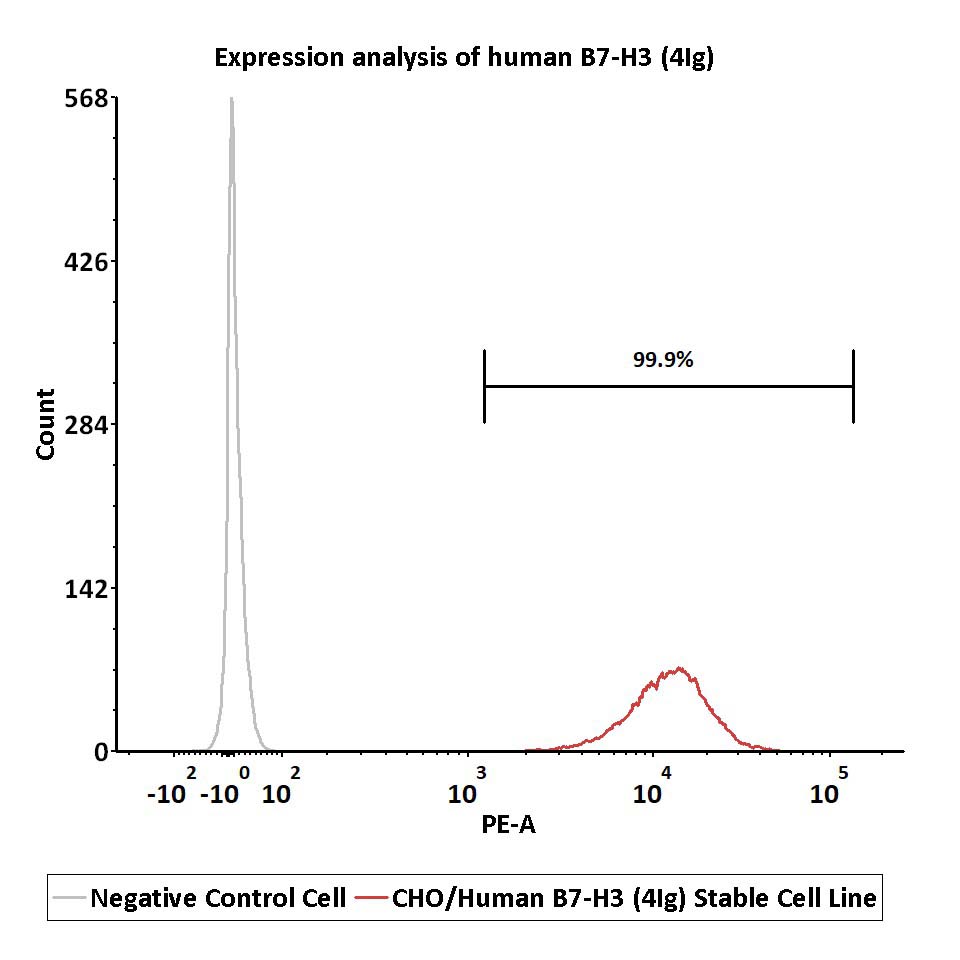- Genetically modified cell lines best reflect MOA (Mechanism of Action)
- Higher activity and larger assay window for robust and reproducible cell-based bioassay
- Comprehensive application data to support assay development and validation
- Full tracible record, stringent quality control and validated cell passage stability
- Parental cell line legally obtained from internationally recognized cell resource bank and commercially licensed
- Global commercial license assistance whenever regulatory filing is required
描述(Description)
The CHO/Human B7-H3 (4Ig) Stable Cell Line was engineered to express the receptor full length human B7-H3 (4Ig) (Gene ID: 80381), used to mimic cancer target cells. Surface expression of human B7-H3 (4Ig) was confirmed by flow cytometry.
应用说明(Application)
• Useful for cell-based B7-H3 (4Ig) binding assay
生长特性(Growth Properties)
Adherent
筛选标记(Selection Marker)
Puromycin (2 μg/mL)
培养基(Complete Growth Medium)
F-12K + 10% FBS
冻存液(Freeze Medium)
Serum-free cell cryopreservation medium
装量(Quantity)
1 vial contains at least 5×10^6 cells in 1 mL serum-free cryopreservation medium
存储(Storage)
Frozen in liquid nitrogen.
支原体检测(Mycoplasma Testing)
Negative
无菌检测(Sterility Testing)
Negative
使用说明(Instructions for Use)
See data sheet for detailed culturing and assay protocol.
Receptor Assay

Expression analysis of human B7-H3 (4Ig) on CHO/Human B7-H3 (4Ig) Stable Cell Line by FACS.
Cell surface staining was performed on CHO/Human B7-H3 (4Ig) Stable Cell Line or negative control cell using PE-labeled anti-human B7-H3 (4Ig) antibody.
Protocol
如有相关细胞池需求请联系我们
背景(Background)
B7 homolog 3 (B7-H3), a member of the immunoglobulin superfamily, is also known CD276, which contains two Ig-like C2-type (immunoglobulin-like) domains and two Ig-like V-type (immunoglobulin-like) domains. B7-H3 may participate in the regulation of T-cell-mediated immune response. B7-H3 also plays a protective role in tumor cells by inhibiting natural-killer mediated cell lysis as well as a role of marker for detection of neuroblastoma cells. Furthermore, B7-H3 is involved in the development of acute and chronic transplant rejection and in the regulation of lymphocytic activity at mucosal surfaces. It could also play a key role in providing the placenta and fetus with a suitable immunological environment throughout pregnancy.
Limited Use&License Disclosure
BY USE OF THIS PRODUCT, RESEARCHER AGREES TO BE BOUND BY THE FOLLOWING TERMS OF LIMITED USE OF THIS CELL LINE PRODUCT.
- If the researcher is not willing to accept the terms of limited use of this cell line product, and the product is unused, ACRO will accept return of the unused product.
- Researchers may use this product for research use only, no commercial use is allowed. "Commercial use" means any and all uses of this product and derivatives by a party for profit or other consideration and may include but is not limited to use in: (1) product manufacture; and (2) to provide a service, information or data; and/or resale of the product or its derivatives, whether or not such product or derivatives are resold for use in research.
- This cell line is neither intended for any animal or human therapeutic purposes nor for any direct human in vivo use . You have no right to share, modify, transfer, distribute, sell, sublicense, or otherwise make the cell line available for use to other researchers, laboratories, research institutions, hospitals, universities, or service organizations.
- ACROBIOSYSTEMS MAKES NO WARRANTIES OR REPRESENTATIONS OF ANY KIND, EITHER EXPRESSED OR IMPLIED, WITH RESPECT TO THE SUITABILITY OF THE CELL LINE FOR ANY PARTICULAR USE.
- ACROBIOSYSTEMS ACCEPTS NO LIABILITY IN CONNECTION WITH THE HANDLING OR USE OF THE CELL LINE.
- Modifications of the cell line, transfer to a third party, or commercial use of the cell line may require a separate license and additional fees. Please contact order.cn@acrobiosystems.com for further details.























































 膜杰作
膜杰作 Star Staining
Star Staining











